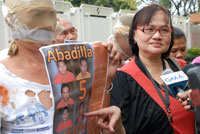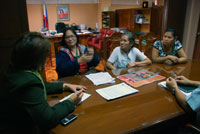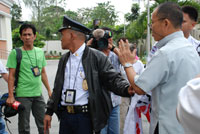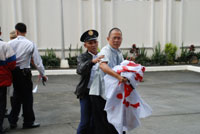 (Manila, January 8, 2009) To renew their demands to have the policemen responsible for torturing their loved ones prosecuted at once, the families of the Abadilla Five held a protest at two government offices dealing with the victim’s complaint on January 7.
(Manila, January 8, 2009) To renew their demands to have the policemen responsible for torturing their loved ones prosecuted at once, the families of the Abadilla Five held a protest at two government offices dealing with the victim’s complaint on January 7.
Simulating the prisoners’ experiences while in police custody after their arrest and subsequent detention in June 1996, five other men volunteered to have their faces wrapped with adhesive tap. They joined protest with the families at the offices of the Commission on Human Rights (CHR) and the Ombudsman for the Military and Other Law Enforcement Office (MOLOEO) respectively.
Cherelyn De Jesus, wife of Joel De Jesus; Marilou Lumanog, wife of Lenido Lumanog and Lolita San Felipe, grandmother of Augusto Santos, had a brief dialogue with Leila De Lima, CHR chair person, calling the latter’s attention to their loved ones complaint.
 It was the CHR who filed a complaint with the Department of Justice (DoJ) for violation of the victims’ rights, in particular the detainees’ rights under custodial investigation, based on the findings of the investigation they had conducted in July 1996.
It was the CHR who filed a complaint with the Department of Justice (DoJ) for violation of the victims’ rights, in particular the detainees’ rights under custodial investigation, based on the findings of the investigation they had conducted in July 1996.
They had the complaint filed with the DoJ’s National Prosecution Service (NPS); however, the prosecutor investigating the case, Marilyn Campomanes, neglected the complaint for not having it resolved and filed in court for five years. Had Campomanes not been charged and punished for neglecting her duties, the DoJ would have not reffered the case to other prosecutors.
Also, despite the CHR’s findings that there are evidence sufficient to prosecute the policemen responsible for torturing the Abadilla Five, in particular Police Superintendents Romulo Sales and Bartolome Baluyot and the members of the defunct Task Force Rolly, the team of prosecutors investigating the case had it dismissed on the ground of subjudice.
The victims’ counsel and the CHR have had to file petitions with the DoJ to review and reconsider their decision, which was eventually granted on January 2003 when Merceditas Gutierrez, former secretary of the DoJ, ordered the case reopened for review. In concluding the review, the DoJ had CHR’s findings affirmed that indeed the police had committed criminal acts. They then endorsed the case for approval and review with the Ombudsman.
However, though the DoJ affirmed the CHR’s findings that the policemen had indeed violated the victims’ rights, they did not rule on the allegations of torture. The nature of charges they have recommended to be filed though was for violation of Articles 263, 286, 124 and 125 of the Revised Penal Code (RPC) and the Republic Act RA 7438.
Under the procedure, before any charges could be filed against security forces in court, the Ombudsman has to review the complaints and they had to come up with recommendations whether or not to proceed with the prosecution of the case in court.
Once again, five years after the DoJ’s endorsement to the Ombudsman for their action, the case never had any progress at all. The last information the victims’ legal counsel, Soliman Santos, came to know was in a letter the Ombudsman sent to him in 16 July 2007 informing him the complaint is still pending for preliminary investigation.
 After concluding a brief dialogue with De Lima, the families then proceeded to the Ombudsman’s office where they are supposed to hold another protest to call for the Ombudsman to act on the complaint at once.
After concluding a brief dialogue with De Lima, the families then proceeded to the Ombudsman’s office where they are supposed to hold another protest to call for the Ombudsman to act on the complaint at once.
Catholic priest Fr. Robert Reyes, staff member of the Hong Kong-based Asian Human Rights Commission (AHRC), was carrying an appeal letter from the AHRC on behalf of the families and victims. The appeal letter renewed reasonable demands upon the Ombudsman to resolve and act on the case at once.
However, even before Fr. Robert have the letter received and the families of the Abadilla Five could hold a protest in front of the Ombudsman, the security guards had them harassed. One of whom physically restrained Fr. Robert from unfolding a streamer demanding for the Ombudsman to act on the Abadilla Five complaint written on it.
 The police, who were present there, obviously never took any action to allow the families from proceeding with their protest. One of the guards even asked whether the group had secured a permit to hold a demonstration. The guards, however, could not provide any rational explanation why they were preventing the families and protesters from unfolding their streamers and to protest.
The police, who were present there, obviously never took any action to allow the families from proceeding with their protest. One of the guards even asked whether the group had secured a permit to hold a demonstration. The guards, however, could not provide any rational explanation why they were preventing the families and protesters from unfolding their streamers and to protest.
The families and the five men, who were simulating the Abadilla Five’s experiences, were not allowed to carry on with the protest. The guards and the police securing the area never let go of them until they had them led out from the Ombudsman office’s premises. The protesters, however, carried on with their protest from outside the gate.
Though the guards allowed Fr. Robert and the families in into the Ombudsman’s lobby to be able to have the appeal letter received, they refused permission for the the families to accompany Fr. Robert to the office where the letter would have been received. As a result, they have not been able to meet the Ombudsman for a dialogue.